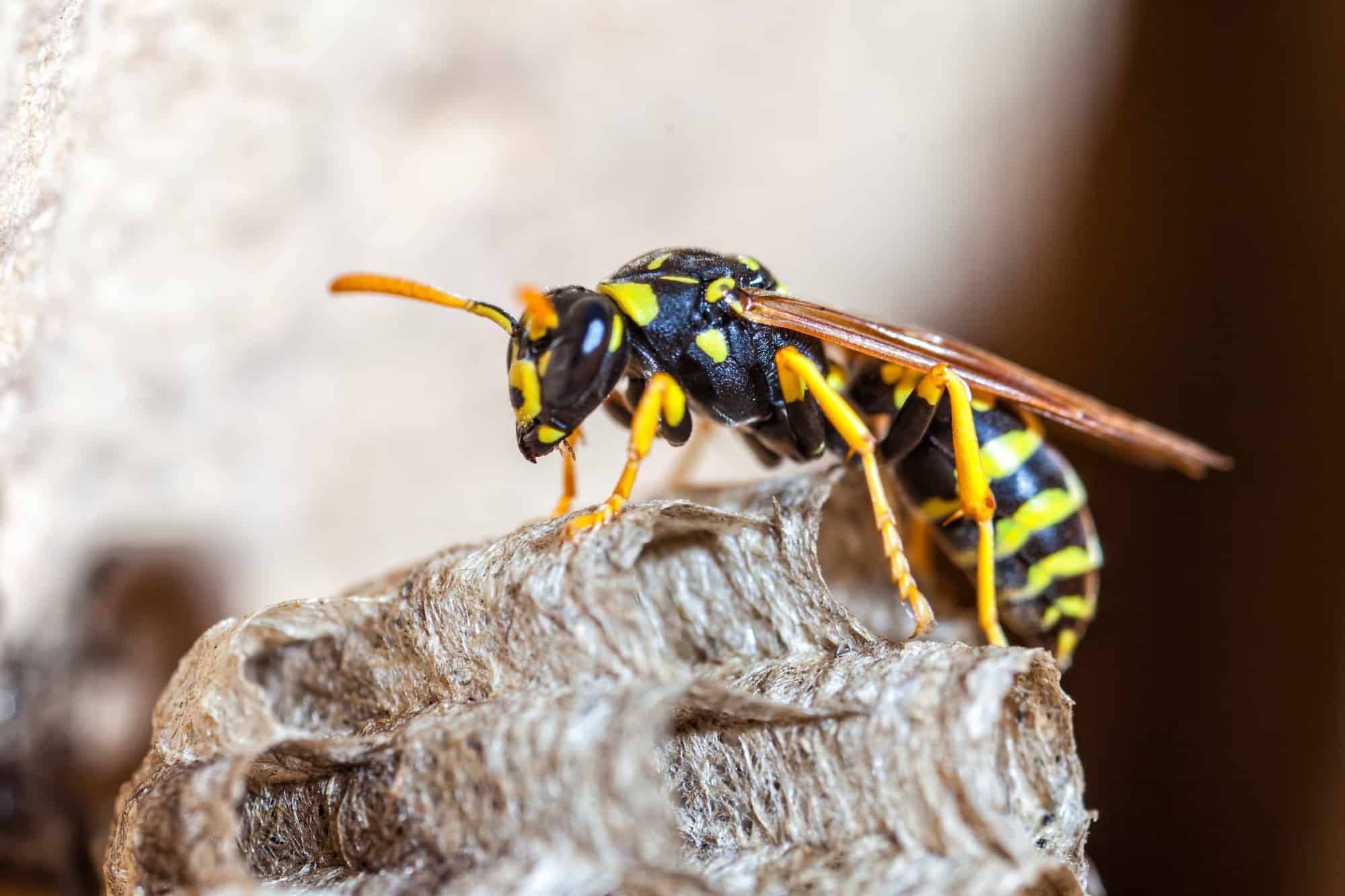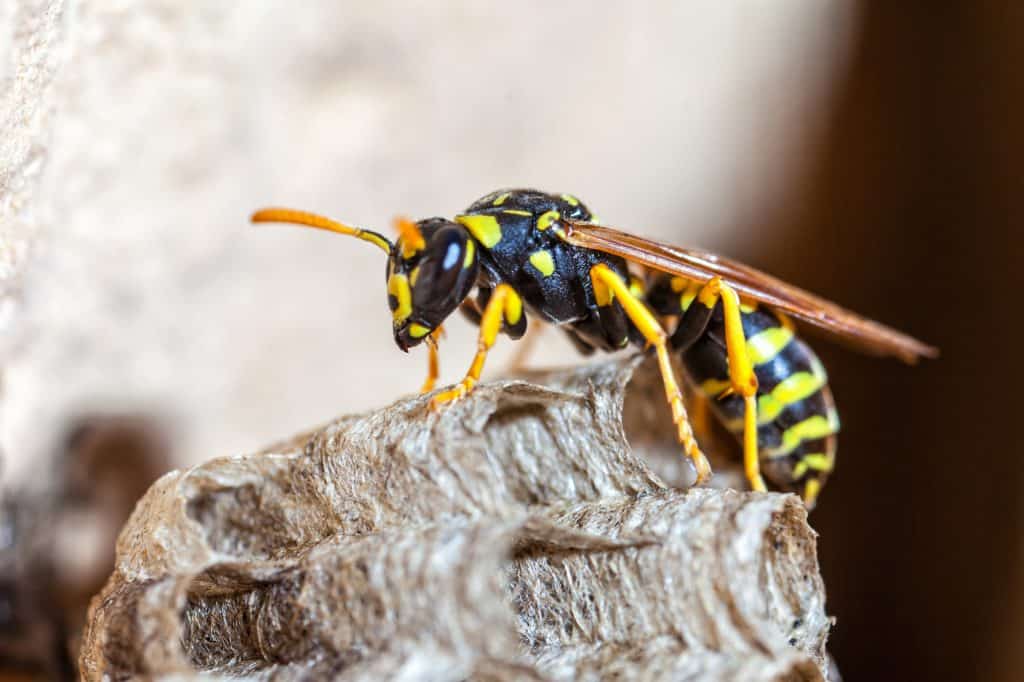Bee and Wasp Control: Safely Get Rid of Those Stinging Pests
- Jun
- 29
- Posted by Darren Duuner
- Posted in Tips & Articles, Wasp or Nest Removal
- off


Now that summer is upon us, Canadians are ducking and running for cover from bees and wasps. The truth is that bee stings are dangerous and potentially fatal.
Across the globe, hundreds of people die each year due to an allergic reaction to stings. At the same time, some bees are considered an endangered species. This had led some homeowners to inquire about removal as opposed to extermination.
Read on for a comprehensive guide to safe bee and wasp control. Explore topics such as locating a hive and removal services. Also, learn how a professional can prevent a bee or wasp infestation from reoccurring.
Different Types of Bees and Wasps
Not all bees are made equal and some are more dangerous than others. As mentioned earlier, wasps are dangerous because they sting repeatedly. Carpenter bees present a risk to your home and other wood structures.
Some bees strings are venomous, such as a honey bee, hornet, or yellow jacket. Others species like the bumblebee are harmless.
Bumblebees are black and yellow with a hairy abdomen. They are easy to spot and present no risk. Carpenter bees, on the contrary, have a hairless abdomen that is large and shiny.
Wasps look entirely different than carpenter bees and bumblebees. They have long, thin, and hairless bodies with cylindrical legs.
Identifying the type of pest is important in determining if treatment is required. If you are unable to identify it, a pest control professional certainly can.
Locate a Bee or Wasp Hive
Tracking down a bee or wasp hive requires patience. Sometimes, a hive is located in an obvious spot on the roof or in a gutter. However, some hives are underground or inside a tree and difficult to find.
Locating a bee or wasp hive begins with monitoring their flight pattern. Do you notice them flying around a common location? Are the bees or wasps coming and going from a single point of entry?
Some fear getting too close to a bee or wasp nest. This is for good reason as wasps, in particular, are known for stinging their victims multiple times.
If this is the case, we recommend contacting a professional to identify the hive location. Your tracking and monitoring efforts will still be useful to a pest control company.
Identifying a Hive
Many homeowners wonder what a bee or wasp hive looks like. Some wasp nests hang from your home or a tree.
Wasp nests feature hexagonal cells and an open design. They vary greatly in size and are often grey or straw colored. Wasps use various different materials with some hives that look like paper.
Harder to spot is yellow jacket nests. Often, they are located underground or other enclosed areas.
Carpenter bees, on the other hand, drill holes in exposed wood. Some signs of a carpenter bee nest are circular holes about the size of a nickel or dime. They are often found on the underside of wood structures and are accompanied by sawdust near the hole.
Grow Wasp Repellent Plants
Did you know that some plants or herbs repel wasps? Better yet, growing wasp-repellant herbs serves a dual purpose as a food seasoning. This is a great method of natural bee and wasp control.
The list of herbs that work to repel wasps is long. It includes popular food seasonings like oregano, dill, basil, and rosemary.
Some plants are known to trap and eat wasps. These plants are referred to as pitcher plants and use nectar and fragrance to lure wasps in.
Perhaps the greatest advantage of pitcher plants is that they are easy to grow. They are pot-grown and require sunny areas. Keeping the soil moist is a must, but otherwise, the maintenance is fairly simple.
Bee and Wasp Removal
If the natural method is ineffective, you can try to remove the bees. This is an increasingly popular option as the public grows sensitive to the plight of bees.
One tool to help facilitate a removal is a bee vac. This tool uses a suction device to safely extract the bees from a nest or hive. The vast majority, if not all, of the bees or wasps will survive the extraction.
Another tool is referred to as a catch box. This tool attracts the bees or wasps and captures them inside.
Extermination Methods
In some cases, the customer is not interested in removing or relocating the beehive. Instead, they are looking for an extermination option and to prevent any future infestations.
There are some over-the-counter products available to fight off bees and wasps. There are chemical sprays and traps used to exterminate particular types of bees.
However, it should be noted that these products rarely get to the root of the problem. Instead, they only kill the bees and wasps that are present.
A trained service professional, on the other hand, will track the pests to their source. Then, they will use powerful and environmentally-safe chemicals to eradicate the nest.
Preventing Future Infestations
The last thing you want is to deal with recurring infestations, each year bringing new frustration and expense. One action to prioritize is sealing all cracks and gaps around doors and windows. The intent here is to prevent bees and wasps from creating a nest inside the home.
Another area of bee and wasp control is to repair any holes in screen doors and windows. These screens must be replaced in order to prevent bees from entering the home.
In some cases, the infestation is rooted in the ground. Here, a natural home remedy is to put a soap and water solution on the nest entrance. Then, cover the ground with soil to prevent any reentry into the nest.
Learn More About Bee and Wasp Control
A bee or wasp infestation is a serious problem that requires attention. There are many different strategies you can employ for bee and wasp control.
Some homeowners prefer to remove the pests, while others grow plants that naturally repel them. One certain way to eliminate the pests is contacting a pest control company. If you want to learn more about bee and wasp control, contact us today to schedule an appointment for safe bee or wasp nest removal in all greater Vancouver, from Burnaby to Maple Ridge, Tsawwassen to Delta, Surrey and Langley.



